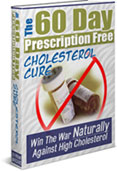Tuesday, March 27, 2007

Keep Your Cholesterol Down!
Everybody knows that cholesterol has much to do with heart disease. Do not worry too much about the dangers of high cholesterol. Knowing what cholesterol is and how it affects you will undoubtedly help you avoid high cholesterol.
1. Cholesterol And Heart Disease
Your blood cholesterol is a major factor in the risk of suffering from heart disease. In fact, the higher your cholesterol level, the greater the chances you have of getting a heart attack. Heart disease is the leading cause of death among men and women in the United States. Every year more than a million Americans suffer heart attacks, and half of that number die from heart disease.
2. How Does Cholesterol Cause Heart Disease?
When your body has too much cholesterol, it builds up in the walls of your arteries. This causes your arteries to harden. Your arteries, as a result of this, narrow down or get blocked. This reduces the flow of blood through your body. Oxygen is carried throughout your body by blood. If an inadequate supply of oxygen to your heart occurs because of reduced blood flow, you may experience chest pains. And if the blood supply is completely cut off, the result is a heart attack.
Unfortunately, high blood cholesterol has no symptoms. So it is hard to gauge the status of your arteries. Whether or not you suffer from heart disease, lowering your cholesterol is important to maintain good health.
3. What Affects Cholesterol Levels?
Read more about Keep Your Cholesterol Down
Read more Lower Cholesterol Levels Articles
Copyright Natural Weight Loss
Plug Stamp: FFGNWL
Cholesterol Levels

Do you know that every year, about 500,000 persons in America suffer from heart disease? One of the main reasons behind this huge number is high cholesterol levels. According to studies, if people lower their cholesterol levels, the risk of heart disease will be reduced by up to 40 percent. But what are these cholesterol levels?
Cholesterol levels include the numbers that will indicate whether the cholesterol in your body is desirable, borderline, or less desirable and high risk. By knowing these levels, you will become aware of your condition, allowing you to take the necessary measures to reduce the risk of heart disease. If your cholesterol has already reached the high-risk level, you can seek medical attention at once for cholesterol medication.
The numbers of cholesterol levels include the average figures for total cholesterol, HDL cholesterol, and LDL cholesterol.
The total cholesterol is HDL cholesterol and LDL cholesterol combined. The ideal level for this is approximately 200mg/dL or less. This is a desirable level and means that you have a relatively small risk of heart attack. But if the level is 200 to 240mg/dL, it is already considered borderline. Any figure higher than 240mg/dL means you are at a high risk for both heart attack and stroke. Meanwhile, the desirable level for HDL cholesterol level is above 45mg/dL, the HDL borderline is 35 to 45mg/dL, and high risk is below 35mg/dL. For LDL cholesterol, the desirable figure is below 130mg/dL, borderline is 130 to 160mg/dL, and high risk is above 160mg/dL.
Read the rest of this Cholesterol Levels article or visit the Lower Cholesterol Information pages
Copyright Natural Weight Loss
Plug Stamp: FFGNWL
